This Man Came to Ahmedabad to Start a Business, but Ended up Starting a School for Slum Kids
Mahesh has also opened a hostel for out-station students that,at present, houses 10 children.
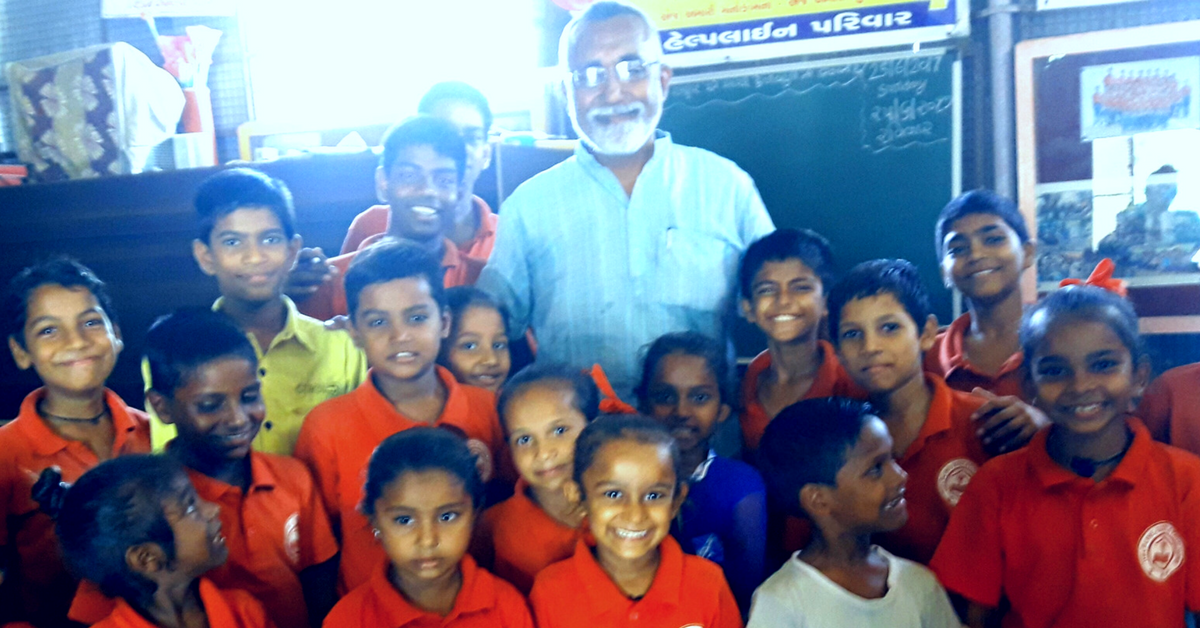
“The best way to find yourself is to lose yourself in the service of others.”
– Mahatma Gandhi
A short distance from the Sabarmati River in Ahmedabad lies one of the biggest slums in the city – Adarsh Nagar. It looks like any other slum, with tiny huts, people sleeping outside in the scorching sun and garbage nearby. However, if you walk just a few steps further, you will find a spotlessly clean compound and almost 40 neatly dressed kids studying inside a one-room school called the Helpline Education Home.
Some 35 years ago Mahesh Desai, who lost his father, migrated from Talegaon, Maharashtra, to Ahmedabad to set up a new business along with his relatives. But something pulled him towards the slums.
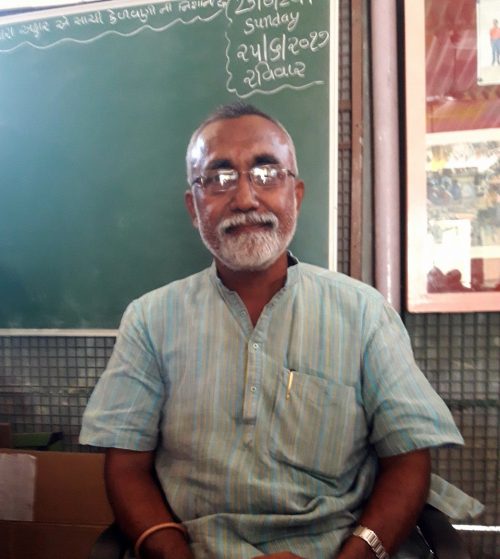
“I hated studies and don’t even remember if I have attended school till class 2 or 3. The first thing I did was learn Gujarati and talk to the slum-dwellers every evening from 5 to 9. After learning that the root cause of all their problems was illiteracy and ignorance, I decided to educate their children,” says Mahesh.
In 1990, Mahesh started taking a systematic approach towards his goals. He would visit different slum areas and collect information about everyone: what they do, where they work, how much they earn, what they eat and why they were unable to change or grow.
“I would eat with them, get groceries for them, would get milk, sugar and tea leaves and ask someone to make tea for all of them and then talk to them. This took me seven long years, but slowly I knew everything about them. There were mothers and daughters forced into prostitution, drug users and drug peddlers, and most of the men would drink everyday,” he says.
For seven years, Mahesh would go each and every day to these slums, collect information, come back home and make a report of each day. He would then collect all 30 reports of the month and make a single analysis report of the month and one single report out of 12 months of the year. By the end of seven years, Mahesh had seven reports, which he condensed into one comprehensive report.
In these years, he also researched about the NGOs working with these people. Some of these NGOs worked only for women, some only for children upto the age of 12 and some only for the physically or mentally disabled. Through his research, Mahesh realized that it was almost impossible to bring about a change in the adults and change the way they were leading their lives. However, if a holistic approach was taken, the next generation could come out of this trap.
As he was all alone in his mission, Mahesh took tiny steps towards his goal. He convinced some 10-15 tea vendors at CG road and near Vastrapur lake to allow him to teach the children who worked for them.
“Back then, there was no law against child labor and I knew many of them who worked for these tea vendors. But it was difficult! I could spare time only from 5 pm to 9 pm after finishing my factory work and those were the peak business hours for them. The tea vendors had allowed me to teach these kids only on one condition: whenever there was a customer they will have to go and serve tea,” says Mahesh.
After failing in his effort to teach these kids for two years, Mahesh decided to start his classes inside the slums. He would sit in any of the abandoned huts and teach the children there. Meanwhile, many of his friends came to know about his work and would offer help.
In 2000, Mahesh registered his NGO, Helpline Trust to keep track of the donations and used the money to build a shed right inside the slum area. However, no one would send their kids to the school there.
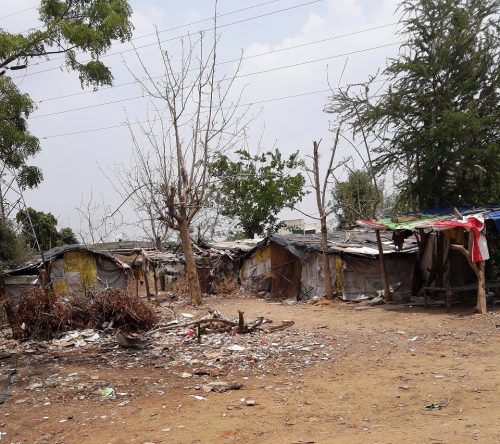
“I would go and counsel the kids and their parents. But days and months passed and there was no one in my school. But then a little girl came to me one day and said, ‘I want to study’. I just hugged her and started teaching her right away. She was 6-year-old Indu Mavi. She is married now and had come to me some time back to tell me how education has helped her,” says Mahesh.
As the school was bang in the centre of the slum, children would see Indu enjoying the lessons and the games taught by Mahesh. Slowly, other children started joining and today there are 40 students in Mahesh’s school coming from many other slums too.
Mahesh has also opened a hostel for out-station students that,at present, houses 10 children who have been admitted to private schools through RTE.
The shed has been converted into a one-room school called Helpline Education Home conducting classes from 1 to 10, and Mahesh proudly says that his school has all the facilities of a private school.
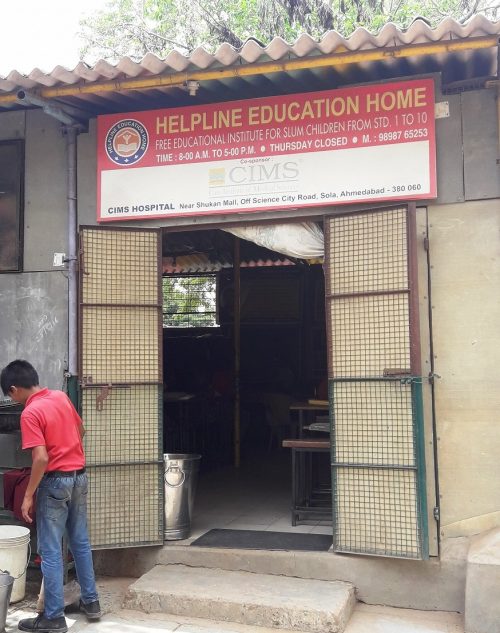
This proved to be true when we interacted with the students. A class 10 student, Chand Pandit, loves music class and confidently asks us to invite him to play the keyboard on stage whenever there is a function.
“I love music but I want to become an army officer and serve the nation,” says Chand.
Meanwhile, Gopal is the Kabaddi champion of the school but his favourite teacher is dance master Meet Patel who comes to teach them for free every weekend.
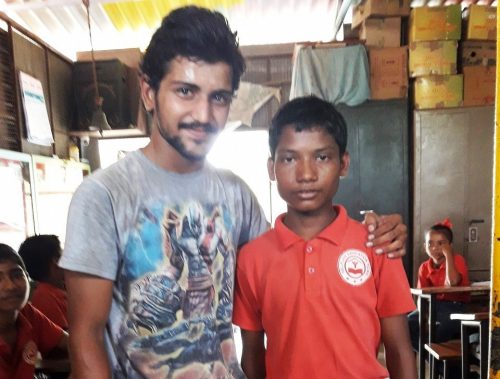
“I teach kids from well-to-do background too. There is no difference in their talents. The only difference is that I teach everything to those kids and these kids teach me more life lessons than I teach them dance,” says Meet.
A class 7 student, Anil wants to become a cricketer when he grows up and help his father, who is a municipality sweeper.
So how does a teacher take classes for all grades in a single room?
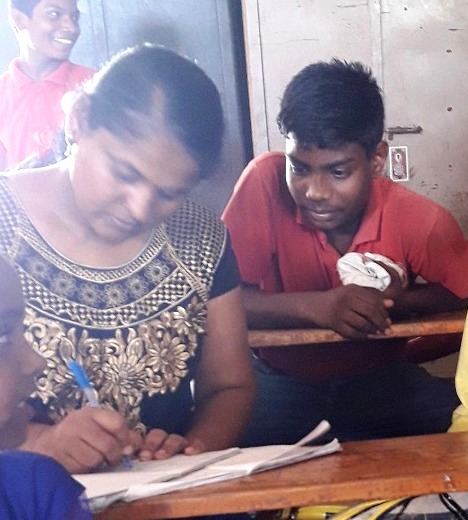
“I don’t stand near the board and teach like a traditional classroom. I sit with each child and teach them. While some solve the given sum or read the assigned chapter, I sit beside the others who need my help,” says Gayatri Joshi who teaches there.
Mahesh shut down his factory five years ago and now dedicates his entire time to the school. He assures the parents that the kids are his responsibility until they get a job, and he is absolutely confident and determined to do this.
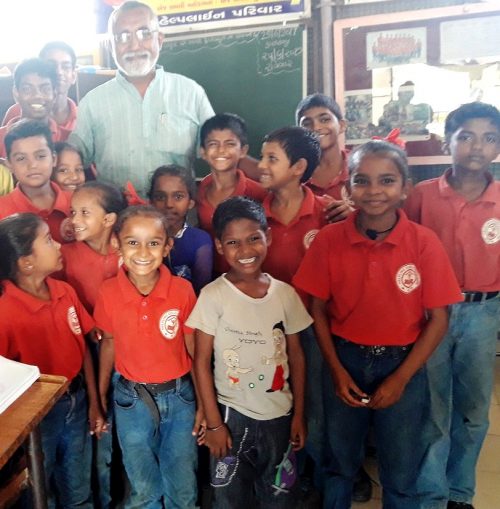
The school commences at 8 am with a prayer. The schedule comprises studies, lunch, snacks and activities such as dance, drawing, craft, music, computers and skating. Students are always encouraged to explore and are given full freedom to express their thoughts and ideas. This increases self-confidence, helping them to develop their personality and etiquette.
“You see the school timings are from 8 amto 5 pm, in which we take a holistic approach for their overall development. By the time they reach home, they are already tired. This helps them keep away from the notorious culture of the slums. My vision is to take each and every kid to class 10 and get them admitted in the Diploma/Degree courses as per their skills and interest. After graduation, our motto will be to help them find employment and thereby a respectful life ahead,” says Mahesh.
Though there are a few loyal donors, Mahesh still struggles to manage the expenses of the school. He pays the salaries of the teachers and the utility bills on priority and appreciates the help of kind shopkeepers who provide all other requirements of the school on credit, which he pays once the NGO gets a donation.
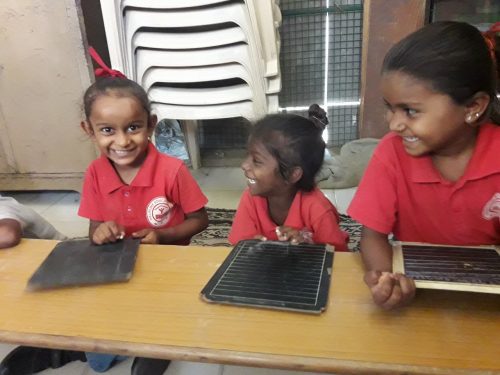
If you wish to help Mahesh, you can mail him at [email protected] or call 9898765253. Visit the school at – Helpline education home, Adarsh Nagar, Opp. Naranpura Main Police Station, Pragatinagar Road, Naranpura, Ahmedabad – 13
You can also donate here –
Name – Helpline
A/c No. – 20063968752
Bank – Bank of Maharashtra
Branch – Ashram Road, Ahmedabad
IFSC code – MAHB 0000773
Like this story? Or have something to share? Write to us: [email protected], or connect with us on Facebook and Twitter.
NEW: Click here to get positive news on WhatsApp!
If you found our stories insightful, informative, or even just enjoyable, we invite you to consider making a voluntary payment to support the work we do at The Better India. Your contribution helps us continue producing quality content that educates, inspires, and drives positive change.
Choose one of the payment options below for your contribution-
By paying for the stories you value, you directly contribute to sustaining our efforts focused on making a difference in the world. Together, let’s ensure that impactful stories continue to be told and shared, enriching lives and communities alike.
Thank you for your support. Here are some frequently asked questions you might find helpful to know why you are contributing?


This story made me
-
97
-
121
-
89
-
167











